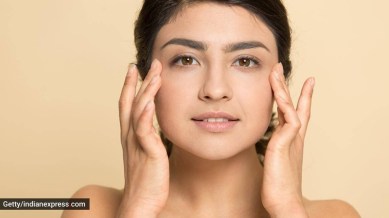📣 For more lifestyle news, click here to join our WhatsApp Channel and also follow us on Instagram
Wellness entrepreneur calls this common kitchen ingredient ‘the best thing for glowing skin’: ‘Eat it, apply it’; experts weigh in
A note of caution: it isn't a miracle product.

Wellness entrepreneur and face yoga expert Vibhuti Arora recently told Rubina Dilaik that she swears by a common kitchen ingredient that can make the skin feel radiant. Responding to Dilaik’s question about ‘One ingredient in the kitchen consumed daily which can brighten the skin’, Arora said, “Ghee. Eat it, apply it, put it on your hair. I love ghee.”
Dilaik then shared that ghee was used to massage her twin daughters and has been an integral part of “how food was introduced to us.” “So, yes, ghee is my favourite,” Dilaik added in her podcast on YouTube.
monthly limit of free stories.
with an Express account.
Taking a cue from their candid confession, we asked experts about its potential for skin.
Is ghee good for skin?
Yes, if used appropriately, pure ghee can provide some benefits for the skin both internally through diet and externally as a topical treatment, said Dr Shweta Nakhawa, consultant dermatologist, KIMS Hospitals, Thane.
From a skincare perspective, ghee is high in:
– Healthy fats to support the skin barrier
– Vitamins A, D, and E, which aid in cell repair, and have moisturising properties to help promote a healthy glow.
– Antioxidants that neutralise free radicals and slow down the ageing process.
Why does ghee work?
Dr Nakhawa said that ghee acts as a natural moisturiser, which helps to lock in hydration and soften dry skin. “It helps heal the skin barrier and soothe mild irritations. When consumed, the healthy fats in ghee support gut health, hormone balance, and skin nutrition,” said Dr Nakhawa.
How to use ghee: (safely)
Internally:
1-2 teaspoons per day, in cooking, or warm water.
As ghee is high in calories, don’t consume excessive amounts, said Dr Nakhawa.
Topically:
Ghee can be used as a natural lip balm or on dry elbows, knees, or cuticles.
Some people also use ghee as a DIY mask with turmeric or honey, but first, do a patch test, Dr Nakhawa noted.
What to consider?
A note of caution: ghee isn’t a miracle product. “The benefits of ghee are most apparent when combined with a good skincare routine and healthy diet,” said Dr Nakhawa.
Kanikka Malhotra, consultant dietician and certified diabetes educator, concurred and shared that many beauty entrepreneurs passionately advocate for its use inside and out, but as a qualified dietitian, she urges nuance. “Ghee is undeniably nutrient-rich, supplying vitamins A, D, E, and K—compounds that support glowing skin and cell repair when eaten in moderation as part of a balanced diet. These nutrients, when absorbed through a well-rounded menu, can subtly enhance skin health over time,” said Malhotra.
According to Dr Nakhawa, if you have oily, acne-prone, or sensitive skin, avoid applying ghee to your face, as it may clog pores.
Choose only pure, organic, or homemade ghee without additives, said Dr Nakhawa. “Ghee is not a substitute for medical treatment for eczema, psoriasis, or other skin conditions; it can be used as a gentle addition under supervision,” said Dr Nakhawa.
DISCLAIMER: This article is based on information from the public domain and/or the experts we spoke to. Always consult your health practitioner before starting any routine.
📣 For more lifestyle news, click here to join our WhatsApp Channel and also follow us on Instagram